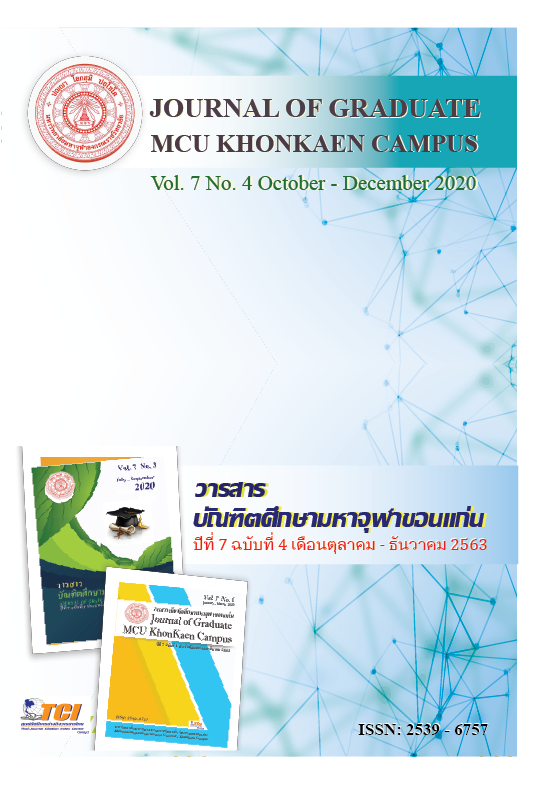กระบวนการจัดการเรียนรู้ของครูภาษาไทยที่เน้นทักษะชีวิต สำหรับนักเรียนระดับมัธยมศึกษาตอนปลาย
Main Article Content
บทคัดย่อ
การวิจัยนี้เป็นการวิจัยเชิงคุณภาพ (Qualitative Research) มีวัตถุประสงค์เพื่อศึกษากระบวนการจัดการเรียนรู้ของครูภาษาไทยที่เน้นทักษะชีวิต ระดับมัธยมศึกษาตอนปลาย กลุ่มเป้าหมายคือ บุคลากรทางการศึกษา และนักเรียนโรงเรียนภูผาม่าน อำเภอภูผาม่าน จังหวัดขอนแก่น สังกัดสำนักงานเขตพื้นที่การศึกษามัธยมศึกษา เขต 25 ได้แก่นางบุญจันทร์ บัวพา ตำแหน่งครู วิทยฐานะชำนาญการพิเศษ และนักเรียนชั้นมัธยมศึกษาปที่ 4 โรงเรียนภูผาม่าน ซึ่งศึกษาในภาคเรียนที่ 2 ปการศึกษา 2562 จำนวน 37 คน เครื่องมือที่ใช้ในการวิจัยคือ กล้องบันทึกวีดิทัศน์ แบบสังเกตแบบสัมภาษณ์ เครื่องบันทึกเสียง แบบบันทึกภาคสนาม และกล้องบันทึกภาพนิ่ง เก็บรวบรวมข้อมูลโดยการบันทึกวีดิทัศน์การจัดการเรียนรู้ของครูภาษาไทยและพฤติกรรมการเรียนวิชาภาษาไทยของนักเรียนในชั้นเรียน สัมภาษณ์ครูผู้สอนภาษาไทย และนักเรียน วิเคราะห์ข้อมูลเชิงคุณภาพที่ได้จากโพรโทคอลและข้อมูลจากการสัมภาษณ์ผู้ให้ข้อมูลสำคัญในรูปแบบของการบรรยายวิเคราะห์
ผลการวิจัยพบว่า กระบวนการจัดการเรียนรู้ของครูภาษาไทยที่เน้นทักษะชีวิต สำหรับนักเรียนระดับมัธยมศึกษาตอนปลายมี 5 กระบวนการ ดังต่อไปนี้ 1) การวิเคราะห์ตัวชี้วัดและการวางแผนหน่วยการเรียนรู้ โดยการระบุตัวชี้วัดการพัฒนาผู้เรียนตามหลักสูตรแกนกลางการศึกษาขั้นพื้นฐาน พุทธศักราช 2551 และตัวชี้วัดการจัดการเรียนรู้ที่เน้นทักษะชีวิต ที่มีความสอดคล้องต่อกระบวนการจัดการเรียนรู้ที่เน้นทักษะชีวิต นำมาบูรณาการร่วมกับตัวชี้วัดจากหลักสูตรแกนกลางการศึกษาขั้นพื้นฐาน พุทธศักราช 2551 โดยใช้ตารางวิเคราะห์ตัวชี้วัด 2) การเตรียมการจัดการเรียนรู้ที่เน้นทักษะชีวิต ได้แก่ การออกแบบแผนการจัดการเรียนรู้ การใช้สื่อประกอบการสอน แบบทดสอบ และใบงานประกอบการสอน 3) การจัดการเรียนรู้ โดยดำเนินการจัดการเรียนรู้วิชาภาษาไทยที่เน้นทักษะชีวิต ได้แก่ ขั้นนำเข้าสู่บทเรียน คือการเตรียมตัวนักเรียนก่อนเริ่มเรียน นำเอาความรู้และทักษะที่นักเรียนมีอยู่เดิมมาสัมพันธ์กับบทเรียนที่ครูกำลังจะสอน ขั้นสอนเนื้อหา ประกอบด้วยกระบวนการจัดกิจกรรมการเรียนรู้ 4 ด้านได้แก่ 1. ด้านการตระหนักรู้และเห็นคุณค่าในตนเองและผู้อื่น 2. ด้านการคิดวิเคราะห์ ตัดสินใจ และแก้ปัญหาอย่างสร้างสรรค์ 3. ด้านการจัดการกับอารมณ์และความเครียด และ 4. การสร้างสัมพันธภาพที่ดีกับผู้อื่น ขั้นสรุปบทเรียน เป็นขั้นตอนในการรวบรวมใจความสำคัญที่ผู้สอนต้องการจะให้ผู้เรียนทราบ โดยให้มองเห็นความสัมพันธ์ระหว่างของความรู้และทักษะต่าง ๆ ที่ได้รับเชื่อมโยงกับทักษะชีวิต
4) การประเมินผลการเรียนรู้ เป็นการตรวจสอบและการประเมินผลการจัดการเรียนรู้ ซึ่งปรากฏอยู่ 3 รูปแบบ ได้แก่ 1.การประเมินผลการเรียนรู้ของนักเรียนก่อนและหลังจัดการเรียนรู้ ตามรูปแบบการประเมินของกลุ่มสาระการเรียนรู้ภาษาไทย 2. การประเมินผลการเรียนรู้ของนักเรียนโดยการสังเกตพฤติกรรม 3. การประเมินผลการเรียนรู้จากใบงาน
5) การส่งเสริมและพัฒนาการเรียนรู้ คือกิจกรรมเสริมที่จัดให้กับนักเรียนนอกเหนือจากการจัดการศึกษาตามหน่วยการเรียนรู้ ได้แก่ กิจกรรมเขียนเล่าประสบการณ์ชีวิตที่ตนประทับใจ ในรูปแบบของเรียงความประกอบภาพถ่าย และกิจกรรมการจัดทำหนังสือเล่มเล็ก เพื่อแบ่งปันเรื่องราวของนักเรียนให้กับผู้อื่นได้อ่านเพื่อให้ผู้เรียนเกิดการเรียนรู้วิชาภาษาไทยที่เน้นทักษะชีวิตดียิ่งขึ้น
Article Details
เอกสารอ้างอิง
กรมสุขภาพจิต. (2543). รายงานการประชุมวิชาการทักษะชีวิต ครั้งที่ 3 เรื่องทักษะชีวิตกับความฉลาด ทางอารมณ์ : สู่สหัสวรรษแห่งการพัฒนาเยาวชนแบบองค์รวม. กรุงเทพมหานคร : กระทรวงสาธารณสุข.
ธนพัชร แก้วปฏิมา. (2547). การพัฒนาแบบวัดทักษะชีวิต สำหรับนักเรียนชั้นประถมศึกษาปีที่ 4-6. กรุงเทพมหานคร : มหาวิทยาลัยเกษตรศาสตร์.
นวรัตน์ สุขวัฒนาสินิทธิ์. (2559). ผลของการใช้รูปแบบการสอน 7E ร่วมกับเทคนิคกลุ่มร่วมมือแข่งขันวิชา หลักภาษาไทยที่มีต่อผลสัมฤทธิ์ทางการเรียนวิชาหลักภาษาไทยและทักษะชีวิตของนักเรียน ชั้นประถมศึกษาปีที่ 1. ใน รายงานการวิจัย. คณะครุศาสตร์ : จุฬาลงกรณ์มหาวิทยาลัย.
สกล วรเจรญิศรี. (2550). การศึกษาทักษะชีวิตและการสร้างโมเดลกลุ่มฝึกอบรมเพื่อพัฒนาทักษะ ชีวิตของนักเรียนวัยรุ่น. วิทยานิพนธ์การศึกษาดุษฎีบณัฑิต สาขาจิตวิทยาการให้คำปรึกษา. บัณฑิตวิทยาลัย : มหาวิทยาลัยศรีนครินทรวิโรฒ.
สัมฤทธิ์ สันเต. (2547). การพัฒนาเครื่องมือประเมินทักษะชีวิตจากกิจกรรมพัฒนาผู้เรียนสําหรับนักเรียนวัยเด็กตอนกลาง. วิทยานิพนธ์การศึกษามหาบัณฑิต : มหาวิทยาลัยขอนแก่น.
สํานักวิชาการและมาตรฐานการศึกษา. (2549). แนวทางการบริหารหลักสูตรและการเรียน การสอนตามหลักสูตรการศึกษาขั้นพื้นฐาน พุทธศักราช 2544 เอกสารการประชุมชี้แจงเจตนารมณ์กระรวงศึกษาธิการ “2549 ปีแห่งการปฏิรูปการเรียนการสอน” ระหว่างวันที่ 15-22 กุมภาพันธ์ 2549.

